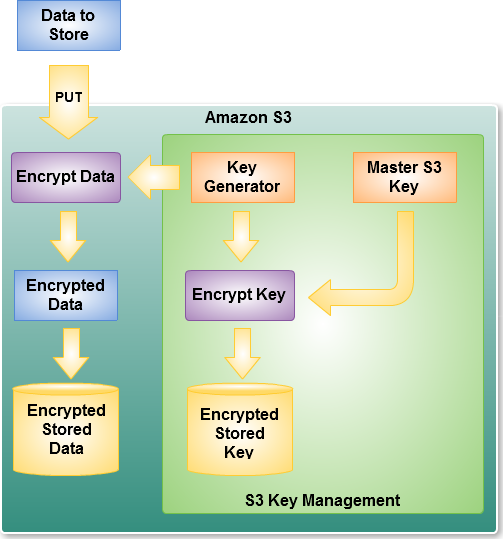AWS News Blog
New – Amazon S3 Server Side Encryption for Data at Rest
A lot of technical tasks that seem simple in theory are often very complex to implement. For example, let’s say that you want to encrypt all of the data that you store in Amazon S3. You need to choose an encryption algorithm, create and store keys (while keeping the keys themselves safe from prying eyes), and “bottleneck” your code to ensure that encryption happens as part of every PUT operation and decryption happens as part of every GET operation. You must take care to store the keys in durable fashion, lest you lose them along with access to your encrypted data.
In order to save you from going through all of this trouble (and to let you focus on your next killer app), we have implemented Server Side Encryption (SSE) for Amazon S3 to make it easier for you to store your data in encrypted form. You can now request encrypted storage when you store a new object in Amazon S3 or when you copy an existing object. We believe that this important (and often-requested) new feature will be welcomed by our enterprise customers, perhaps as part of an overall strategy to encrypt sensitive data for regulatory or compliance reasons.
Amazon S3 Server Side Encryption handles all encryption, decryption, and key management in a totally transparent fashion. When you PUT an object and request encryption (in an HTTP header supplied as part of the PUT), we generate a unique key, encrypt your data with the key, and then encrypt the key with a master key. For added protection, keys are stored in hosts that are separate and distinct from those used to store your data. Here’s a diagram of the PUT process for a request that specifies SSE:

Decryption of the encrypted data requires no effort on your part. When you GET an encrypted object, we fetch and decrypt the key, and then use it to decrypt your data. We also include an extra header in the response to the GET to let you know that the data was stored in encrypted form in Amazon S3.
We encrypt your data using 256-bit AES encryption, also known as AES-256, one of the strongest block ciphers available. You can apply encryption to data stored using Amazon S3’s Standard or Reduced Redundancy Storage options. The entire encryption, key management, and decryption process is inspected and verified internally on a regular basis as part of our existing audit process.
You can use Amazon S3’s bucket policies to allow, mandate, or forbid encryption at the bucket or object level. You can use the AWS Management Console to upload and access encrypted objects.
To learn more, check out the Using Encryption section of the Amazon S3 Developer Guide.
— Jeff;
PS – There’s no additional charge for SSE.